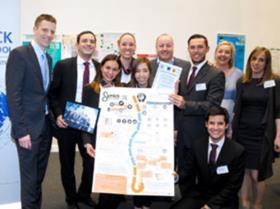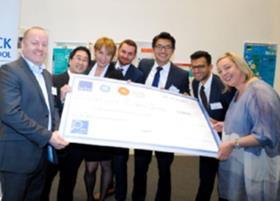The Executive MBA Team from Warwick Business School emerge the winners with their analysis of the life-threatening condition in Australia and New Zealand
Partnered with GE Healthcare, GE Healthcare Finnamore, the UK Sepsis Trust and the Stocker Partnership, the Warwick Business Case Challenge 2017 saw 11 teams from academic institutions across the world visit Warwick Business School for the two-day event in May.
Prior to arriving, teams were asked to conduct research into the sepsis care pathway (recognition, diagnosis, treatment, monitoring and management) in healthcare systems around the world and into the ways in which people, process and technology are being harnessed to improve this pathway. Teams were asked to complete a full literature review on the topic and present their findings in the form of an A1 poster on the Friday evening.

They were tasked with identifying the impact of sepsis, the key pressure points it causes within healthcare systems, and therefore the current challenges that need to be addressed.
Limited background information was provided, together with a reading list to kick-start the research process.
Saturday morning saw teams begin to bring their ideas to life.
Having been assigned a country to present on they were asked to prepare a presentation which addressed the challenge: “Design and recommend a new and innovative intervention that changes the way in which sepsis is managed in their allocated country or region* (thereby reducing the burden on intensive care of sepsis admissions). This intervention may relate to people, process and/or technology.”
Saturday afternoon saw presentations from each of the 11 teams, with varied innovations emerging:
- Developing a GE app and online tool for clinicians to help early detection of sepsis in Brazil.
- A traffic light awareness campaign for the public in France.
- A product design with full business plan to tackle sepsis caused by skin infection in the young indigenous population of Australia and New Zealand.
- A self-testing chair to help with early detection and hospital visits in China.
- A ‘Sepkit’ available in the community for first aiders in Canada.
- A baby delivery kit for midwives in Sub-Sahara / Africa.
- A public awareness campaign with branded products for families in India.
- Commercialisation of a rapid testing kit in the US.

Then came the finalist round prior to which the final three teams, Alberta Business School, Aston Business School and Warwick Business School were given a wildcard: “You have just presented on the intervention you designed for the country or region that each team was assigned. Over an hour, we challenged them to outline the lessons they had learned that could be applied to other markets and to include these as part of their final presentation.”
The final presentations had a panel of six judges who struggled with appointing a winner due to the quality and hard work on all of the presentations. Deliberations were fraught but in the end the winners were the Executive MBA team from Warwick Business School with their analysis of sepsis in Australia and New Zealand. The team gave facts, selected a specific market and challenge: “Preventing skin infection in Australia and New Zealand’s indigenous children”.
They pitched their ideas and product and talked their audience through the reasoning behind their social enterprise as well as talking through a supporting business plan which was handed out to judges.
The event was again a huge success enjoyed by all involved and certainly raised the awareness of sepsis throughout the challenge, so much so that WBS Executive MBA team have kindly donated £500 of their prize money to The UK Sepsis Trust.



























No comments yet